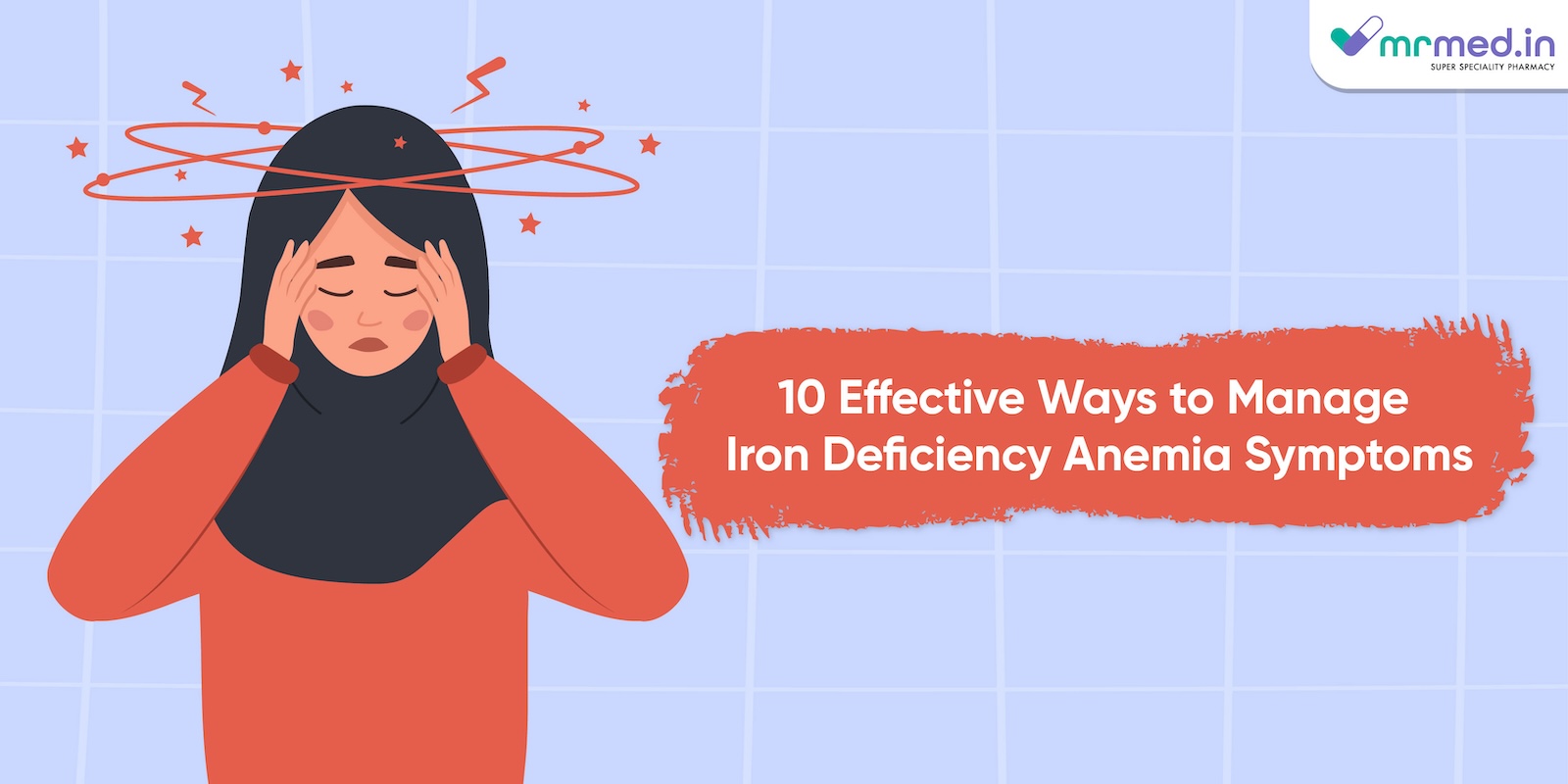10 Effective Ways to Manage Iron Deficiency Anemia Symptoms

Iron deficiency anemia happens when your body doesn't have enough iron elements to make healthy red blood cells. These cells carry oxygen around your body. If you have this condition, you might find it hard to sleep, feel tired, weak, have trouble exercising, or get headaches. These symptoms can last for about six to eight weeks even after you start getting treatment to replace the iron your body needs. They can really affect how you feel and what you can do in your daily life.
Managing Sleep
Research shows that people with anemia often have difficulty in sleeping. Anemia has been linked to breathing issues during sleep and other sleep problems like night terrors and sleepwalking. These issues can make you feel tired during the day if you have anemia.
1. Treating Insomnia
To improve your sleep, you can:
- Stick to a regular sleep routine: Try to go early to bed and wake up at the same time every day, even on weekends .
- Stay active: Even though IDA can make you feel tired, exercise can give you more energy in the long run and help you sleep better at night. Start with short walks and gradually increase your activity level.
- Try relaxation techniques: Practices like meditation and visualization may help you relax and fall asleep easier.
2. Managing Fatigue
Feeling tired all the time is common with anemia. Even if you are getting enough sleep, you might still feel worn out. This fatigue can make you feel weak.
To help manage tiredness:
- Sleep well: Aim for seven to nine hours of sleep each night. Avoid oversleeping, as this might make you feel even more tired. Short naps are okay, but limit them to 20-30 minutes a day.
- Eat regularly: Have smaller meals and snacks every few hours instead of big meals less often to keep your energy levels up.
- Relax: Stress uses up a lot of energy, so try relaxation activities like exercise, spending time with friends, or listening to music to conserve energy.
- Stay hydrated: Try to drink plenty of water throughout your day. Even mild dehydration can make you feel more tired, so make sure to drink water and eat foods with lots of water, like fruits and veggies, to stay energized.
3. Restless Leg Syndrome
Research shows that individuals with iron deficiency anemia (IDA) are more likely to experience restless legs syndrome. This means they may feel strange sensations in their legs that cause them to move involuntarily during sleep.
Doctors suggest checking for iron deficiency anemia in people with restless legs syndrome. Taking iron supplements can help improve symptoms in those who have both conditions.
4. Finding the underlying cause
Treating iron deficiency anemia (IDA) may not work well if the reasons behind it are not dealt with. Common causes of IDA include:
- Low iron in your diet: Not eating enough iron-rich foods can cause IDA. For instance, vegetarians might not get sufficient iron from what they eat.
- Medical conditions like celiac disease: If celiac disease isn't managed properly, it can lead to anemia. This happens because celiac disease damages your small intestine, making it hard for your body to absorb iron and other nutrients.
- Pregnancy: When you're pregnant, your body needs more iron because your blood volume increases. If you don't get enough iron during pregnancy, it can cause IDA.
- Chronic inflammation: Some health conditions that cause ongoing inflammation can lead to anemia. Inflammation can stop your body from using iron to make red blood cells.
Note:
It is important to work with your doctor to find out why you have IDA and treat that underlying cause. It is because not all the people with IDA can be treated with oral iron pills, some may be intolerant to oran iron. In such cases doctors prescribe iron injections such as Feruno 500mg Injection who are intolerant to oral iron preparations and this varies based on underlying cause for IDA. so, Treating the root problem often helps replace iron and increase hemoglobin levels and to determine the right treatment for you.
5. Managing psychological effects
Studies show a connection between not having enough iron and mental health. People with iron deficiency anemia (IDA) might feel anxious, depressed, or have bipolar disorder.
There are some ways to manage these psychological effects. Here are some options for managing anxiety or depression:
- Talk therapy: You can talk to a therapist to figure out why you're feeling anxious or depressed. About 75% of people find this helpful.
- Medication: If anxiety or depression is really bad and affecting your life, your doctor might suggest medication like anti-anxiety pills or antidepressants to help you feel better.
Managing Other Symptoms
Iron deficiency anemia (IDA) can cause more than just feeling tired. You might also notice other symptoms like craving non-food items (pica), headaches, cold hands and feet, a fast heartbeat, and feeling short of breath. These are common signs of IDA, but they can be managed.
6. Dealing with Pica
Pica is the term commonly used when you crave things that aren't food, like dirt or paper. It can happen to pregnant people or kids with IDA. If you or your child have pica, tell your doctor. They can explain the risks. Try finding substitutes for what you're craving, like sugarless gum, or ask someone to help you avoid non-food items.
7. Dealing with Headache
Headaches often come with iron deficiency anemia (IDA). You can try over-the-counter painkillers, but if they don't work, talk to your doctor. If you're pregnant, ask your doctor which painkillers are safe for you. There are different medications that your physician can prescribe to help with IDA-related headaches, like headache pills, antidepressants and other anti-anemic medications. Relaxation techniques like biofeedback and eating healthy foods can also help.
8. Keeping your body warm
It's normal to feel cold in your hands and feet when you have iron deficiency anemia (IDA). To stay warm, wear good shoes and socks for your feet, and mittens or gloves for your hands. Dressing in thin layers can also help keep your body warm. Try to avoid caffeine and nicotine because they can make you feel even colder.
9. Reduce triggering symptoms
If your doctor hasn't found any heart problems, you don't need treatment for symptoms like a fast heartbeat and feeling short of breath from iron deficiency anemia (IDA). But it's important to avoid things that could make these symptoms worse.
To reduce triggers:
- Try relaxing activities like yoga or deep breathing.
- Stay away from stimulants like caffeine and nicotine, which can make symptoms worse.
10. Change Your Diet
Changing your diet is key to managing iron deficiency anemia (IDA) and dealing with its effects. Here's what you can do:
- Eat foods rich in iron: Foods like lean meat and seafood have a type of iron that's easier for your body to absorb. If you're a vegetarian and don't eat much of these foods, you might get IDA because the iron in plant foods is harder for your body to use.
- Choose foods that help absorb iron: Foods like orange juice, strawberries, and certain fruits and veggies with vitamin C can help your body absorb iron from plant-based sources better.
- Cut back on caffeine: Foods and drinks with caffeine can make it harder for your body to absorb iron. You don't have to give up caffeine entirely, but try not to have it with iron-rich meals or when you're taking iron supplements.
Conclusion
Iron deficiency anemia can make you feel very tired, affect your sleep, and even make you feel anxious or sad. To feel better, you can try things like sleeping well, eating foods with lots of iron, and staying active. It is important to get support from your loved ones and doctors when your symptoms are bad.
Note: IndiBlogHub features both user-submitted and editorial content. We do not verify third-party contributions. Read our Disclaimer and Privacy Policyfor details.







